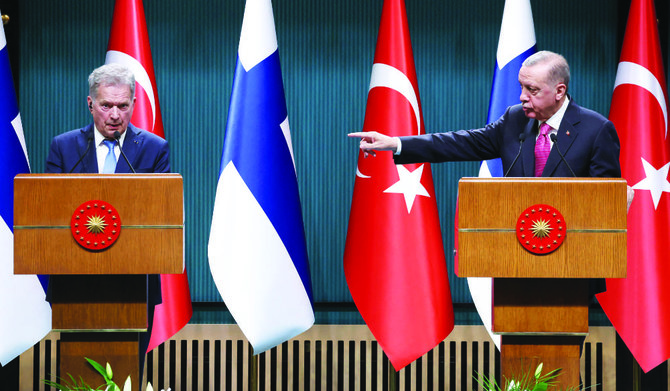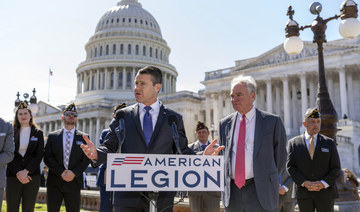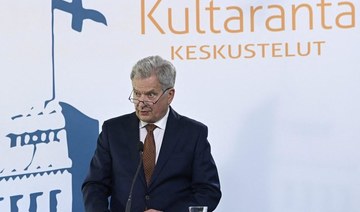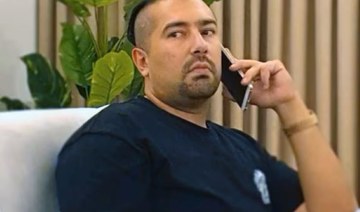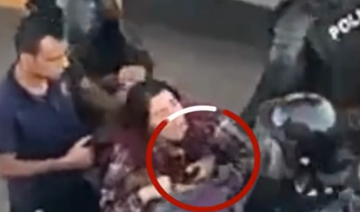ANKARA: Turkish President Recep Tayyip Erdogan has ended months of diplomatically charged delays and asked parliament to quickly back Finland’s bid to join NATO.
A simultaneous decision by fellow holdout Hungary to schedule a Finnish ratification vote for March 27 means the US-led defense alliance will likely grow to 31 nations within a few months.
NATO’s expansion into a country with a 1,340-km border with Russia will roughly double the length of the bloc’s current frontier with its Cold War-era foe.
Finland had initially aimed to join together with fellow NATO aspirant Sweden — a Nordic power facing a litany of disputes with Turkiye that ultimately sunk its chance to join the bloc before an alliance summit in July.
Helsinki and Stockholm ended decades of military non-alignment and decided to join the world’s most powerful defense alliance in the wake of Russia’s invasion of Ukraine.
FASTFACTS
• NATO’s expansion into a country with a 1,340-km border with Russia will roughly double the length of the bloc’s current frontier with its Cold War-era foe.
• NATO Secretary-General Jens Stoltenberg welcomed Turkiye’s decision while stressing the importance of Sweden also joining ‘as soon as possible.’
• US National Security Adviser Jake Sullivan said the US urged Hungary to conclude its ratification process both for Sweden and Finland ‘without delay.’
• France called Turkiye’s announcement about Finland ‘an important signal’ while reiterating support for Sweden’s bid as well.
Their applications were accepted at a June NATO summit that signaled the Western world’s desire to stand up to Russia in the face of Europe’s gravest conflict since WWII.
But the bids still needed to be ratified by all 30 of the alliance members’ parliaments — a process that got hung up once it reached Turkiye and Hungary.
The breakthrough followed months of tense negotiations between Ankara and the Nordic neighbors that threatened to collapse several times.
Erdogan told Finnish President Sauli Niinisto that Helsinki had shown a strong commitment to addressing Ankara’s security concerns.
“We decided to start the protocol of Finland’s accession to NATO in our parliament,” Erdogan told reporters after the talks.
Erdogan added that he “hoped” that parliament will approve the application before Turkiye’s crucial general election in May.
The Turkish parliament is expected to end its current session in mid-April.
NATO Secretary-General Jens Stoltenberg welcomed Turkiye’s decision while stressing the importance of Sweden also joining “as soon as possible.”
“The most important thing is that both Finland and Sweden become full members of NATO quickly, not whether they join at exactly the same time,” Stoltenberg said.
The White House echoed the NATO chief’s position. National Security Adviser Jake Sullivan said the US urged Hungary to conclude its ratification process both for Sweden and Finland “without delay.”
And France’s Foreign Ministry called Turkiye’s announcement about Finland “an important signal” while reiterating support for Sweden’s bid as well.
Erdogan had accused the Nordic neighbors of breaking the terms of a separate deal they reached in June 2022 under which Turkiye agreed to approve the bids.
Turkiye has sought the extradition of dozens of Kurdish and other suspects it accuses of ties to outlawed militants and a failed 2016 coup attempt.
Erdogan’s demands became more urgent as he neared a May election in which he will need a strong turnout from nationalist supporters to extend his two-decade rule.
The Turkish leader voiced particular displeasure with Sweden — a country with a larger Kurdish diaspora and a longer history of disputes with Ankara.
Finland and Sweden had initially resisted the idea of breaking up their bids.
But Swedish Prime Minister Ulf Kristersson — who made NATO membership a priority after assuming office in October — acknowledged on Tuesday that the likelihood of Finland joining the bloc on its own had “increased.”
The Finnish president called Erdogan’s decision “very important for the whole of Finland.”
But he added: “Finland’s application is not complete without Sweden.”
Sweden expressed disappointment at being excluded from this round of NATO expansion.
“This is a development that we did not want, but that we were prepared for,” Foreign Minister Tobias Billstrom told reporters in Stockholm.
The talks in Ankara put more pressure on Hungary’s parliament to end its own ratification delays.



